Part 1 - Results and
table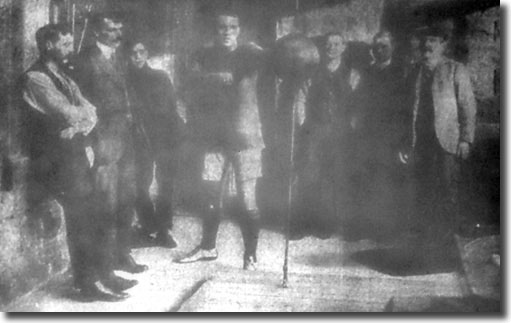
The autumn of 1910 had brought a dour struggle for Leeds City. A clutch
of newcomers from across the Irish Sea had brought a note of excitement
to a club troubled by its financial strictures, but they had taken time
to adapt to the English game and City had been slow off the mark, losing
their opening four games.
Form had picked up and the Peacocks climbed to 14th by the New Year,
but their displays were erratic, veering wildly between the exhilarating
and the mediocre: in November and December they shipped four goals at
Burnley and Barnsley, while managing quartets themselves against Stockport
and Gainsborough.
1911 opened no more promisingly, with a 2-0 defeat on January 7. Sportsman
reported in the Leeds Mercury, 'Leeds City gave a most feeble and
disappointing exhibition when opposed to Glossop at Elland Road … The
Leeds backs were absolutely overwhelmed by the opposition front rank,
who, time after time, beat the defence in a manner which bordered on the
farcical. Throughout this period Glossop were almost continually in the
vicinity of , who, more than once, saved his charge when his colleagues
were hopelessly beaten … One can pay few compliments to Leeds City. Bromage
was one of the few men whose reputation did not suffer. But for him the
defeat would have been heavier. Affleck and Creighton were a pair of poor
backs, with the latter the more unsatisfactory. Morris, who contributed
some useful defensive work, was the best half, but Cubberley, especially,
and Horsley were weak, and quite unable to hold their opponents. The forwards
were a ragged and disjointed line.'
The following week, Frank Scott-Walford
led a party on the now customary pre-FA Cup training trip to Ben Rhydding
near Ilkley. City faced the manager's former Brighton and Hove Albion
team in the first round of the competition at Elland Road.
In those days Southern League teams were rated every bit as highly as
clubs in the Football League; Southampton reached the FA Cup final in
1900 and 1902 and Tottenham won the trophy in 1901. Brighton had secured
the Southern League title in 1910 and went on to beat league champions
Aston Villa to secure the FA Charity Shield. They represented a stern
test for City.
There was little reason for Leeds to anticipate success. Only once had
they progressed beyond the first round of the FA Cup, in 1909 when they
defeated Oldham in a replay. They could plead the luck of the draw, with
four successive first round ties on opponents' turf.
City went off with a will, seemingly determined to overpower Albion on
a heavy surface, but the Brighton defence repelled their assault and after
four minutes the visitors took the lead. Longstaff got to the byline and
Harry Bromage could only knock his cross to the ground; Jones prodded
the ball home. The City defence protested long and loud that the ball
had gone over the goal line before Longstaff had cut it back. The referee
consulted his linesman but allowed the goal to stand.
Undeterred, City swept back into the attack and were unlucky when a header
from Morris struck the crossbar. They were soon level, however.
Bromage caught another centre from Longstaff five minutes before half
time, and kicked on quickly to Cubberley, who passed to McLeod at halfway.
Flaneur in the Mercury: 'The City centre was away like a flash
between the opposing backs, and in full cry for goal, when Whiting, who
had only one chance, came out to intercept. McLeod shot over the keeper's
head, and had the mortification of seeing the ball strike the crossbar
and rebound. But Roberts had followed close behind McLeod, and he shot
into an untenanted goal, to the accompaniment of a tremendous burst of
enthusiasm.'
The effort in the first half had its effect on the Peacocks and they
tired noticeably thereafter, with Jones and Smith heading in more crosses
from Longstaff to secure a 3-1 victory for Brighton.
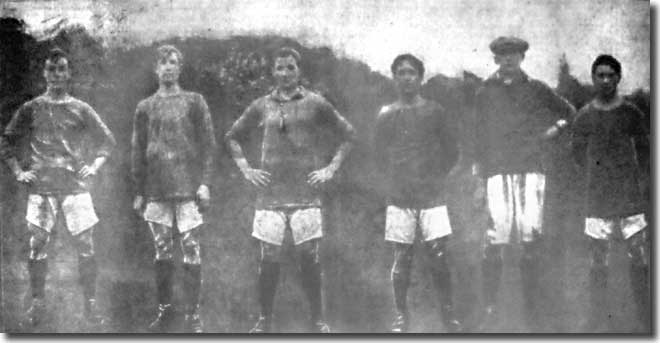 Flaneur:
'Leeds City are to be congratulated on the fight they made, not blamed
because defeat overtook them. Perhaps they erred in tactics. They might
have done better had they gone in for more long swinging passes; they
might not have lost three goals had Cubberley played nearer the line and
helped Creighton to watch Longstaff, who was easily the greatest of the
Brighton forwards, and from whom all the dangerous attacks came. Cubberley
played a hard and plucky game, but he and Creighton were not a match for
Jones and Longstaff, and it may be that had the City captain given more
attention to the outside man the Brighton inside-forwards would have been
more effective.
Flaneur:
'Leeds City are to be congratulated on the fight they made, not blamed
because defeat overtook them. Perhaps they erred in tactics. They might
have done better had they gone in for more long swinging passes; they
might not have lost three goals had Cubberley played nearer the line and
helped Creighton to watch Longstaff, who was easily the greatest of the
Brighton forwards, and from whom all the dangerous attacks came. Cubberley
played a hard and plucky game, but he and Creighton were not a match for
Jones and Longstaff, and it may be that had the City captain given more
attention to the outside man the Brighton inside-forwards would have been
more effective.
'Brighton were too clever in nearly all departments and only one Leeds
City man stood out as a great class player. This was McLeod, who played
a magnificent game throughout, and, on that form, would have been worth
a place in any team in the country. But while McLeod stood out alone among
his colleagues, I have not a word to say in disparagement of the others.
They played up to the best of their abilities, and if their abilities
are not equal to those of a leading Southern League team, well, that is
a matter for the directors. Of this I am convinced, that few Second Division
teams would have beaten Leeds City on Saturday's form.'
The Citizens returned to League action with a visit to bottom placed
Lincoln City on 21 January, and were soon behind. Platts dispossessed
a City player from the kick off and Lincoln broke into the Leeds penalty
area, where Affleck brought down Barrell. Gardner scored from the penalty
spot and Leeds were 1-0 down within the first sixty seconds.
It was City who did most of the attacking thereafter, with Morris twice
heading against the bar and referee Mr Field of Mickleborough turning
down what looked a reasonable appeal for a penalty. Leeds could not capitalise
on their possession and seemed destined to taste defeat as the end approached.
The City forwards had shown "a lamentable lack of finish near the goal"
(The Yorkshire Post), but Enright snatched a goal and a share of the spoils
two minutes from time to maintain City's points advantage over Lincoln.
The Peacocks now faced a West Yorkshire derby against Huddersfield Town,
enjoying their debut season in the Football League and sitting in 14th,
a point clear of City.
The Terriers were founded in August 1908 and had been elected to the
League during the summer. They were managed by Dick Pudan, who had played
at full-back alongside the legendary Billy McCracken for Newcastle United
in the FA Cup final in 1908.
The first match between City and Huddersfield at Leeds Road in September
was the initial episode in a long running local rivalry and the new boys
had beaten City 3-2 with a couple of soft goals. The Peacocks were desperate
for revenge and the two points that would take them above their local
rivals.
They took the game to the visitors early doors and dominated proceedings
in the first half hour. Croot hammered in a tremendous shot which was
blocked and the onrushing Harkins flashed the rebound high over the bar.
Despite all the pressure City could not force home their advantage and
against the run of play Huddersfield took the lead. Breaking down the
right, Harris fed Richardson, who cleverly beat Cubberley and Creighton
and fired a cross shot home off the upright.
back to top
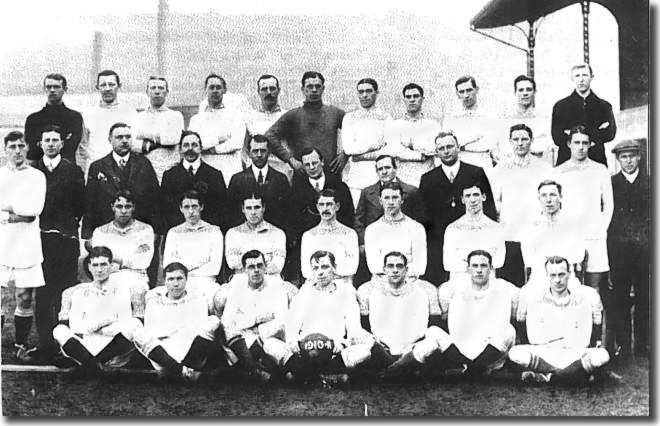 The
goal might have shaken City, but they bounced back immediately. Attacking
with numbers, the Leeds forwards pressed the goal and were rewarded with
a penalty when Billy McLeod was upended. Fred Croot coolly restored equality
from the spot and minutes later McLeod shot home from close quarters to
send City in at half time with a 2-1 advantage.
The
goal might have shaken City, but they bounced back immediately. Attacking
with numbers, the Leeds forwards pressed the goal and were rewarded with
a penalty when Billy McLeod was upended. Fred Croot coolly restored equality
from the spot and minutes later McLeod shot home from close quarters to
send City in at half time with a 2-1 advantage.
After the break, Leeds overwhelmed Town, as reported in the Yorkshire
Post: 'The home players resumed with zest, and with only five minutes
gone the Leeds total was increased by Croot. His speed carried him successfully
through, and the shot was one of his characteristic stingers … At the
end of twenty-seven minutes' play another disaster overtook the visitors,
as Mulholland drove the ball fiercely into the net from a pass by McLeod.
Ten minutes later McLeod put the City still further in front. He secured
the ball near the centre line, and at once made for the Town goal, easily
beating the half-backs, but, when threatened by a back, passed at once
to Roberts on the right, who in turn shot for goal and as the centre had
continued his advance he snapped the ball up again near the post and scored
cleverly. With victory secured Leeds seemed to slacken their efforts slightly,
and this gave Huddersfield their opportunity. Five minutes from the close
of play the ball was headed about in front of the City goal, it eventually
going to McCubbin, who shot into the net without opposition.'
The Leeds Mercury: 'Huddersfield Town did not exactly cover themselves
with glory on the occasion of their first visit to the Elland Road enclosure,
Leeds City, who have not, for a considerable period, obtained so many
goals in a League game, succeeding by the substantial margin represented
by five goals to two. Nor does the score over estimate the superiority
of the winners, who throughout held a decided advantage, and both fore
and aft proved themselves the better side. A crowd of something like 10,000
appeared to thoroughly appreciate Leeds City's return to form. Certainly
Leeds City improved considerably on one or two recent exhibitions, the
men combining in a much more convincing fashion. Then again there was
less of that aimless and ill-directed kicking which on previous occasions
has more often than not placed an opponent in possession, and converted
Leeds City from an attacking into a defending side.
'Perhaps the most gratifying feature of the game, from a Leeds point
of view, was the distinct improvement of the forwards when in front of
goal. For Leeds City to obtain five goals in a League game is something
of a novelty, and one is glad to have the opportunity of congratulating
them regarding a matter which has so often provided material for adverse
comment. Hogg, who again took the place of Bromage in goal, enjoyed a
comparatively easy afternoon, though he stopped one or two hard shots
in a satisfactory manner. Creighton was the better of two backs who, despite
one or two lapses, performed in creditable fashion, though Affleck was
occasionally weak in his returns. Morris was the best of the intermediate
line, though Cubberley (who, however, was apt to neglect his wing at times)
and Harkins gave a useful exhibition.
'Of the forwards McLeod and Croot were seen to most advantage. The last
named thoroughly justified his reinclusion, and at the close his clever
work met with merited approval. If Croot can only produce such form regularly,
the left wing will prove more menacing to opposition defences than for
some time past.'
The following week it seemed likely for long periods of the game at Birmingham
that City would secure another win. They played well and a goal just before
half time by McLeod, shooting through a forest 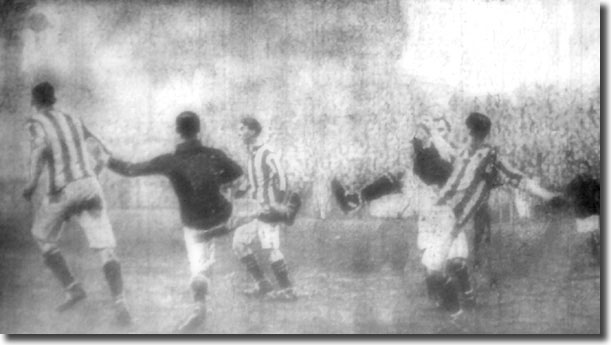 of
legs, looked enough to settle matters. Unfortunately two goals in the
closing seconds by the Midlanders sent the Peacocks home pointless. They
were more fortunate on 11 February when beating an under strength West
Bromwich Albion side 3-1 at Elland Road, as reported by Flaneur in the
Mercury: 'The roar of the crowd recalled some of the old time Rugby
matches: the soccer enthusiasts were genuinely enthusiastic; the directors
applauded unstintingly; the excitable person who jumps up to see incidents
that he can see just as well seated blocked the view of those behind him
more frequently than usual; Mr Scott- Walford was at his post at the pavilion
entrance to shake the members of the City team by the hand as they retired
from the well won field; and everything went as merrily as a marriage
bell. If only this had come off in the Brighton Cup-tie.
of
legs, looked enough to settle matters. Unfortunately two goals in the
closing seconds by the Midlanders sent the Peacocks home pointless. They
were more fortunate on 11 February when beating an under strength West
Bromwich Albion side 3-1 at Elland Road, as reported by Flaneur in the
Mercury: 'The roar of the crowd recalled some of the old time Rugby
matches: the soccer enthusiasts were genuinely enthusiastic; the directors
applauded unstintingly; the excitable person who jumps up to see incidents
that he can see just as well seated blocked the view of those behind him
more frequently than usual; Mr Scott- Walford was at his post at the pavilion
entrance to shake the members of the City team by the hand as they retired
from the well won field; and everything went as merrily as a marriage
bell. If only this had come off in the Brighton Cup-tie.
'It was indeed a capital performance to defeat so capable a team as West
Bromwich Albion, even if the visitors lacked the services of such men
as Pearson, their goalkeeper, Jesse Pennington, the famous left full-back,
and McNeal, the left-half, and Leeds City certainly distinguished themselves
in all departments. They established a lead of two goals in the first
half, and if, for half an hour after the interval, West Bromwich Albion
played the cleverer football and reduced the margin by one goal, the City
came again near the close and, in scoring the best point of the match,
settled the issue.
'For the peace of mind of the spectators, it was just as well that the
game ended in Leeds City's favour, for, a quarter of an hour after the
commencement, the home team claimed a goal, the disallowing of which caused
a good deal of feeling among those who were in a position to see the incident
much more clearly than the referee, Mr C C Fallowfield. Good work by McLeod
and Enright ended in the latter shooting, and, though Moorwood cleared,
it was claimed that the ball had passed over the line. Mr Fallowfield,
who was near the centre of the ground, could not possibly see so fine
a point, and so West Bromwich got the benefit of the doubt, to the indignation
of some who were in a position to see and many who were not.
'Fortunately the incident was followed by some exciting play, and there
was no doubt about McLeod's goal, headed after a centre by Roberts, nor
was there any question as to the legitimacy of the header by Mulholland
from Croot's centre, which gave the home team their second goal, and enabled
Leeds City to turn round and face the wind with a substantial advantage.
Up to half time West Bromwich had done very little attacking, but, on
change of ends, they settled down to football more in keeping with their
traditions, and, within five minutes Wright had shot through from a centre
by Buck, Pailor apparently deliberately allowing the ball to pass between
his legs to his colleague, who was better placed.
'At this point, it seemed that Leeds City were in for a very hard task
to retain the lead. There were signs of weakening in their attack, though
their defence held up brilliantly against a very clever forward line.
Once, however, Wright put in a header at close quarters, but Hogg threw
himself at the ball and brought off a big save. Had the visitors equalised
at that point they might have won, for they were playing the more confident
game, but the home defenders 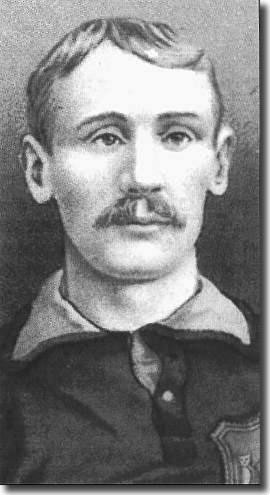 continued
steady under pressure and eventually the City forwards returned to their
first half form, and as the game was drawing to a close, Roberts went
up the right wing and centred to McLeod, who had the defence beaten when
he passed to Enright, for the little inside-left to bang the ball into
the net and thus make victory secure.
continued
steady under pressure and eventually the City forwards returned to their
first half form, and as the game was drawing to a close, Roberts went
up the right wing and centred to McLeod, who had the defence beaten when
he passed to Enright, for the little inside-left to bang the ball into
the net and thus make victory secure.
'We saw Leeds City at their best in this match. The team were dashing
and enthusiastic, yet they never lost their coolness, and, while there
was no dallying in front of goal there were few of those weak lunges that
have marked some of the City performances. In a word, the home side played
like footballers. They showed that there is both skill and intelligence
in the team, and they gave a crisp display that thoroughly merited the
reward.'
City were still in the lower reaches of the table, a mere five points
above the re-election positions, but a draw at Hull and four straight
wins thereafter propelled them to 11th by 25 March, ten points in hand
on the bottom two with eight games remaining.
In that run, the 2-0 victory at Bradford Park Avenue on 4 March was probably
the highlight. A couple of weeks earlier, former
City manager Gilbert Gillies had resigned his post at Park Avenue,
frustrated by the team's inconsistent displays. City were in fine fettle,
prompting Flaneur to write, 'It was skill, combination, and, above all,
splendid pluck and determination that carried the Leeds City team through
to as notable a victory as the club has gained this season. The well considered
methods of the directors and manager in their abandonment of the foolish
old policy of chop and change have bred in the team a thorough understanding.
Not a man failed in this match at Park Avenue, and it was the smooth working
of the team in all departments, coupled with the brilliance of Bromage,
the coolness and skill of Morris and McLeod, and the fighting qualities
of the whole side that brought success against a team that fondly imagined
they could reverse the result of the October match at Elland Road.'
A 1-0 victory against table topping Bolton on 25 March was clear demonstration
of City's improved play, prompting this from Sportsman in the Mercury:
'The home team well deserved their success, which, had their forwards
been a little less impetuous and more methodical in front of goal, might
have been gained by a greater margin. Nevertheless, taking all in all,
they gave a most creditable exhibition, and, though two or three were
more prominent than their fellows, every man had reason to be satisfied
with his work. Perhaps more than at any time in their career, Leeds City
are playing with the combination of a team, and, though they may never
rise to great heights in a purely scientific sense, they are displaying
a dash and determination which is rapidly carrying them to a position
in the League table which, a few months ago, it appeared unlikely they
would attain.'
back to top
A goalless draw at home to Burnley was a disappointment, but the memory
was quickly eclipsed by the 4-0 trouncing of Stockport County, with Harry
Bromage saving a penalty and braces from McLeod and Mulholland crowning
a powerful display. The victory left City ninth, terminating any faint
chance of a need to apply for re-election as County were left teetering
on the edge. Leeds had taken 14 points from 16, conceding just four goals
in the process, a startling upturn in fortunes; it had taken the 19 matches
to December 27 to secure the season's first 14 points.
A 2-0 first half lead at Derby on 8 April seemed likely to bring more
success, but County fought back strongly after the resumption to ensure
the points were divided.
Good Friday, 14 April, saw City meet table topping Chelsea at Stamford
Bridge and for the second time in four months a Chelsea forward netted
a hat trick against them. In December it had been George Hilsdon; on this
occasion it was Scottish international Angus Douglas who did the damage
in a 4-1 reverse. McLeod headed a consolation goal after Croot's effort
came back off the crossbar.
The game proved to be the final appearance in the City first-team for
long serving Harry Bromage, who was to depart Elland Road at the end of
the season. It was played before a crowd of 50,000, quite the biggest
audience before which City had ever played.
The next day, Tony Hogg took Bromage's place in goal for the local derby
against Barnsley, bringing the first change to the selected eleven in
ten matches, during which only the Chelsea game had ended in defeat. Such
stability had been invaluable in instilling some consistency in the team's
play, but they had to be content with a point from a goalless draw against
the South Yorkshire team. At half time the players stood in silent tribute
to John Chapman, their trainer, who had died during the week.
With little to play for, the final few games of the season were undistinguished:
after a 1-0 defeat at Clapton Orient, what little excitement there was
in a dull game at Leicester Fosse was restricted to the frenetic final
five minutes. All three goals, two of them penalties, came in that period,
as City lost 2-1 in a game described in the Mercury as 'mediocre, dull
and uninteresting'.
The season wound down with a 1-0 home win against Wolves. Sportsman:
'The play during the opening half was of a tame, uninteresting description.
Leeds City held the advantage but failed to develop a number of promising
advances, and more than one good opening was frittered away in disappointing
fashion. Following the resumption there was a decided improvement, though,
even so, Leeds City were still lacking in finish and penetrative power,
else, despite the sturdy defence of the Wanderers' backs, they had prevailed
by a more substantial margin … In the Leeds City goal Hogg accomplished
the little he had to do in a satisfactory manner. Affleck was more than
once cleverly outwitted by Brook during the first half, whilst Creighton
was occasionally beaten by the enterprising Harrison, who dropped across
some fine centres. Nevertheless, the Leeds City backs at times intervened
and cleared in effective fashion, and, though not subjected to undue pressure,
gave a useful exhibition. Cubberley was the pick of the intermediate line,
and plied his wing with some nice passes, whilst Harkins was serviceable.
Kelly, who took the place of Morris at centre-half, worked hard and often
bothered the Wolverhampton inside-forwards. 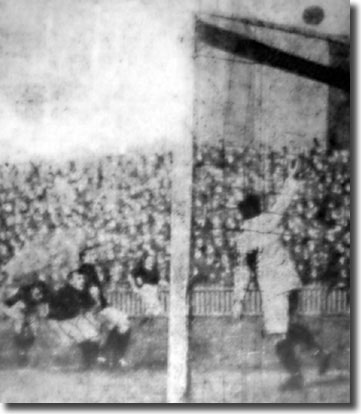 He
is, however, deficient in the finer arts of the game, and, as a distributing
force, was hardly a success. Though he served out some nice passes, McLeod,
like Enright, has played better, and his display at close quarters was
not particularly convincing. Foley, who operated at inside-right vice
Mulholland, was responsible for some smart footwork, and gave a promising
exhibition, whilst Croot and Roberts contributed some good dashes on the
wings. The weather was cold and cheerless, whilst the showers which fell
at intervals prior to the commencement doubtless had some effect on the
attendance, which only reached 4,000.'
He
is, however, deficient in the finer arts of the game, and, as a distributing
force, was hardly a success. Though he served out some nice passes, McLeod,
like Enright, has played better, and his display at close quarters was
not particularly convincing. Foley, who operated at inside-right vice
Mulholland, was responsible for some smart footwork, and gave a promising
exhibition, whilst Croot and Roberts contributed some good dashes on the
wings. The weather was cold and cheerless, whilst the showers which fell
at intervals prior to the commencement doubtless had some effect on the
attendance, which only reached 4,000.'
It was a tepid conclusion to a lacklustre campaign.
City had recovered splendidly from a disastrous opening month to produce
their best closing position since the arrival at the club of Frank Scott-Walford,
but progress had been neither invigorating nor glorious. The team's performances
were far too patchy for that. They beat six of the top seven teams, yet
contrived to lose to the bottom two.
Away form was marginally better than the previous two dismal seasons,
and the defence was tighter, keeping a clean sheet in 11 of the 38 League
games. Tom Morris was the cornerstone of the team, missing only two games
all season. Of Scott-Walford's Southern League signings, only the centre-half
now merited a regular place in the team. He was well supported by the
full-backs and wing-halves, George Affleck, Alec Creighton, John Harkins
and Stan Cubberley, who missed just 14 games between them. The most outstanding
performers all season long were Morris ('a tower of strength … in a class
to himself') and Creighton ('a back of no mean order').
The selectors had kept faith with a stable line up and Billy Gillespie,
Joe Enright, Fred Croot, Hugh Roberts and Billy McLeod also figured in
more than 30 matches. McLeod was again top scorer with 14 goals, but he
got strong support from Tom Mulholland (9) and Croot (8), along with the
two Irish lads, Enright and Gillespie.
The influx of new talent had hinted that it might make for better times
ahead, but things were set to worsen dramatically in the year to come.
The club was always strapped for cash, giving management little scope
to improve the playing staff. If Leeds City wanted a new player, they
would have to get him on the cheap, or go scouting in the schools. All
Scott-Walford's buys were bargain basement - most came and went without
making much impression.
It had become clear at the start of the season that the club's financial
situation was serious - the twelve months yet to come would bring no reprieve.
Part 1 - Results and
table












 Flaneur:
'Leeds City are to be congratulated on the fight they made, not blamed
because defeat overtook them. Perhaps they erred in tactics. They might
have done better had they gone in for more long swinging passes; they
might not have lost three goals had Cubberley played nearer the line and
helped Creighton to watch Longstaff, who was easily the greatest of the
Brighton forwards, and from whom all the dangerous attacks came. Cubberley
played a hard and plucky game, but he and Creighton were not a match for
Jones and Longstaff, and it may be that had the City captain given more
attention to the outside man the Brighton inside-forwards would have been
more effective.
Flaneur:
'Leeds City are to be congratulated on the fight they made, not blamed
because defeat overtook them. Perhaps they erred in tactics. They might
have done better had they gone in for more long swinging passes; they
might not have lost three goals had Cubberley played nearer the line and
helped Creighton to watch Longstaff, who was easily the greatest of the
Brighton forwards, and from whom all the dangerous attacks came. Cubberley
played a hard and plucky game, but he and Creighton were not a match for
Jones and Longstaff, and it may be that had the City captain given more
attention to the outside man the Brighton inside-forwards would have been
more effective. The
goal might have shaken City, but they bounced back immediately. Attacking
with numbers, the Leeds forwards pressed the goal and were rewarded with
a penalty when Billy McLeod was upended. Fred Croot coolly restored equality
from the spot and minutes later McLeod shot home from close quarters to
send City in at half time with a 2-1 advantage.
The
goal might have shaken City, but they bounced back immediately. Attacking
with numbers, the Leeds forwards pressed the goal and were rewarded with
a penalty when Billy McLeod was upended. Fred Croot coolly restored equality
from the spot and minutes later McLeod shot home from close quarters to
send City in at half time with a 2-1 advantage. of
legs, looked enough to settle matters. Unfortunately two goals in the
closing seconds by the Midlanders sent the Peacocks home pointless. They
were more fortunate on 11 February when beating an under strength West
Bromwich Albion side 3-1 at Elland Road, as reported by Flaneur in the
Mercury: 'The roar of the crowd recalled some of the old time Rugby
matches: the soccer enthusiasts were genuinely enthusiastic; the directors
applauded unstintingly; the excitable person who jumps up to see incidents
that he can see just as well seated blocked the view of those behind him
more frequently than usual; Mr Scott- Walford was at his post at the pavilion
entrance to shake the members of the City team by the hand as they retired
from the well won field; and everything went as merrily as a marriage
bell. If only this had come off in the Brighton Cup-tie.
of
legs, looked enough to settle matters. Unfortunately two goals in the
closing seconds by the Midlanders sent the Peacocks home pointless. They
were more fortunate on 11 February when beating an under strength West
Bromwich Albion side 3-1 at Elland Road, as reported by Flaneur in the
Mercury: 'The roar of the crowd recalled some of the old time Rugby
matches: the soccer enthusiasts were genuinely enthusiastic; the directors
applauded unstintingly; the excitable person who jumps up to see incidents
that he can see just as well seated blocked the view of those behind him
more frequently than usual; Mr Scott- Walford was at his post at the pavilion
entrance to shake the members of the City team by the hand as they retired
from the well won field; and everything went as merrily as a marriage
bell. If only this had come off in the Brighton Cup-tie. continued
steady under pressure and eventually the City forwards returned to their
first half form, and as the game was drawing to a close, Roberts went
up the right wing and centred to McLeod, who had the defence beaten when
he passed to Enright, for the little inside-left to bang the ball into
the net and thus make victory secure.
continued
steady under pressure and eventually the City forwards returned to their
first half form, and as the game was drawing to a close, Roberts went
up the right wing and centred to McLeod, who had the defence beaten when
he passed to Enright, for the little inside-left to bang the ball into
the net and thus make victory secure. He
is, however, deficient in the finer arts of the game, and, as a distributing
force, was hardly a success. Though he served out some nice passes, McLeod,
like Enright, has played better, and his display at close quarters was
not particularly convincing. Foley, who operated at inside-right vice
Mulholland, was responsible for some smart footwork, and gave a promising
exhibition, whilst Croot and Roberts contributed some good dashes on the
wings. The weather was cold and cheerless, whilst the showers which fell
at intervals prior to the commencement doubtless had some effect on the
attendance, which only reached 4,000.'
He
is, however, deficient in the finer arts of the game, and, as a distributing
force, was hardly a success. Though he served out some nice passes, McLeod,
like Enright, has played better, and his display at close quarters was
not particularly convincing. Foley, who operated at inside-right vice
Mulholland, was responsible for some smart footwork, and gave a promising
exhibition, whilst Croot and Roberts contributed some good dashes on the
wings. The weather was cold and cheerless, whilst the showers which fell
at intervals prior to the commencement doubtless had some effect on the
attendance, which only reached 4,000.'